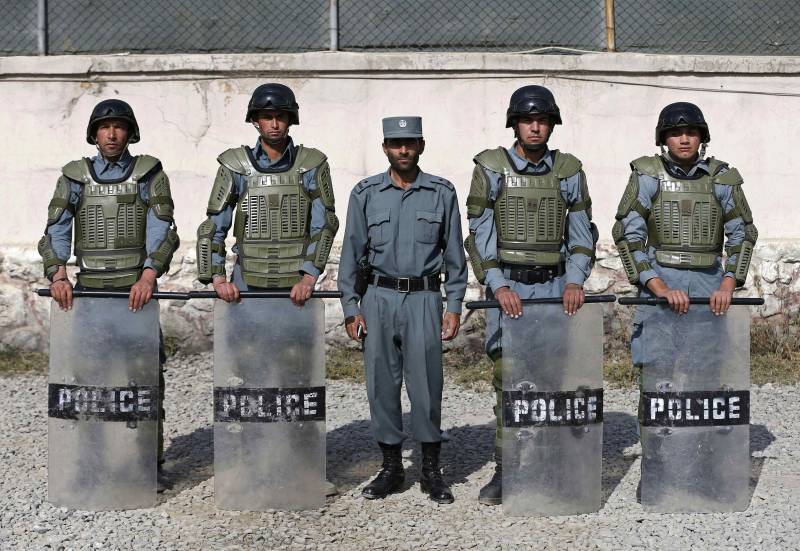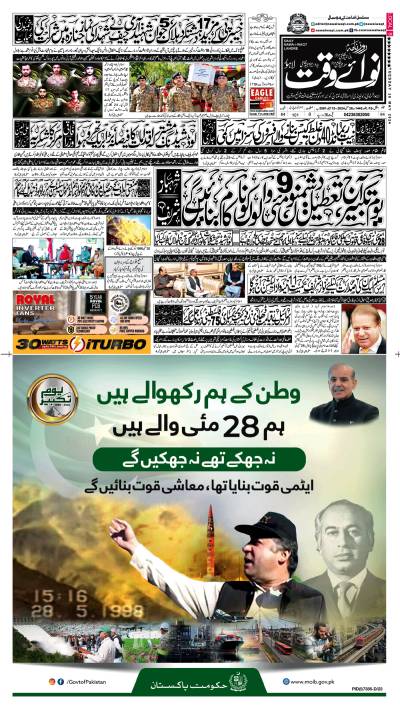If one goes by the words uttered by the new Afghan president Ashraf Ghani in Islamabad after his meeting with Pakistan Prime Minister Nawaz Sharif, a new determined beginning has been made in the relations between the two countries.
For thirteen years, pro-India Mr. Hamid Karzai kept blaming Pakistan for exporting terrorism and the destabilization of his country. All domestic ills and evils including failure of law and order, were heaped on Pakistan. He went ahead in 2011 to forge a strategic partnership agreement with India which inter alia included the training, equipping and capacity-building of the Afghan military officers by the Indian security personnel.
Ashraf Ghani’s visit was thus a fresh breeze blowing across the border.
Said the Afghan president: “enormous steps have been taken in the last three days to overcome the obstacles in ties between the two countries during the past 13 years”.
Mark his words: “We must also overcome the past and not allow the past to destroy the future”.
One wonders if just one visit could change a relationship which for decades has remained characterized by distrust and hostility. Right from the beginning, Kabul’s attitude was unfriendly. The only country which voted against the entry of Pakistan into the United Nations in 1947 was our western neighbor, Afghanistan.
One may here take note of the special efforts made by the Pakistan government to woo the new president of Afghanistan. One after the other, Kabul was visited by our chief of army staff, advisor for security and foreign affairs and the president of Pakistan. Thus, ground was prepared for the new Kabul administration to respond positively to Pakistan’s bid for a change in the relations between the two countries.
Let us look at the vision shared by president Ashraf Ghani and prime minister Nawaz Sharif. To quote Mr. Ghani: “What we have agreed upon is a shared vision where Pakistan and Afghanistan will serve as the heart of Asia to ensure that economic integration becomes a reality and does not remain a dream.” He also mentioned the benefits the two countries could reap through enhanced connectivity in terms of gas, energy and oil pipelines. Rightly, he further observed that “any instability in Pakistan affects us and any instability in Afghanistan affects you and that is where I think our common understanding of new threats will enable us to delineate pathways where actions will be concrete and speak louder than words.” In other words, a “new narrative” was to be unfolded to forge a new relationship between the two countries. Pakistan, he added, will continue to be “our partner” as strong bonds between the two countries are vital for the region. President Ashraf Ghani invited Nawaz Sharif to visit Kabul and remarked that he looked forward to Nawaz Sharif’s next visit to Afghanistan when “more gigantic steps” would be taken.
In the press statement after the meeting, the two leaders resolved to forge a robust economic partnership by expanding trade, promoting investment, improving infrastructure, building roads and rail links and enhancing energy collaboration.
The question is: will all these sweet words lead to substantial results or remain just wishful thinking?
Both the countries are presently beset with formidable difficulties and challenges. The withdrawal of Nato forces from Afghanistan by the end of the year conjures up a daunting challenge for the Afghan government. Kabul will have to fall back on its own army to face the formidable Taliban. The Bilateral Security Agreement will provide limited support. The economic conditions could worsen considerably as aid from outside will dwindle. The unity government manufactured by the US rests on a fragile ground and could run into serious trouble if differences crop up between Abdullah Abdullah and Ashraf Ghani.
Pakistan too has been lurching from one crisis to another. The challenge from Imran Khan and Tahir-ul-Qadri looms large on the horizon. Things can go awry on November 30 and in the days to follow. Qadri is back and has already started flexing his muscles. The gas and electricity tariffs and shortages are grist to the mills of the increasingly strident opposition. And the IDPs could become restless and create turbulent conditions in a province where a hostile party is in power.
How long will the military operations continue in FATA is not quite clear. Also India’s move to keep the eastern border under fire continues souring the relations between the two countries.
Sartaj Aziz’s untimely statement that Pakistan should not target militant groups that did not “pose a direct threat to the state” caused an unnecessary flutter in diplomatic circles within the country and abroad. Even after the clarification from the Foreign Office, we have received a rap on the knuckles from the US state department which issued the statement: “we have long communicated to the Pakistan government our view that militant groups including the Pakistani Taliban and the Haqqani Network continue to pose a threat to Pakistan, to the region and to the United States.” Our COAS currently in Washington, in a hard hitting speech at a Pakistan embassy dinner, pledged to continue the war against all terrorist groups. He assured the US administration that none of the terrorist groups would be spared. He remarked: “I would like to openly say that this operation is against all hues and colours and it is without any exception whether it is the Haqqani network or Tehreek-e-Taliban or anyone else.”
Pakistan has to tread carefully while developing its stand on crucial issues. What exactly has our policy been towards the Haqqani group? What is the nature of our current relationship with them? Have they crossed over to Afghanistan or are they still somewhere in the border areas within Pakistan? How are we to use our clout to help the Afghan government initiate reconciliation with the Afghan Taliban led by Mulla Umar?
Above all, how are we quickly to follow-up the broad agreements arrived at during Ashraf’s visit to Pakistan? How about mustering valuable expertise available in Pakistan and setting up a think-tank exclusively to deal with this task, bringing in such experienced retired ambassadors as Najamuddin Sheikh, Rustam Mohmand, Ashraf Kazi, Maleeha Lodhi, Riaz Ahmad Khan, Asif Aezdi as well as knowledgeable luminaries like Mushahid Hussain Syed and Hina Rabbani Khar.
The writer is an ex-federal secretary and ambassador, and a freelance political and international relations analyst.
pacadepak@gmail.com






